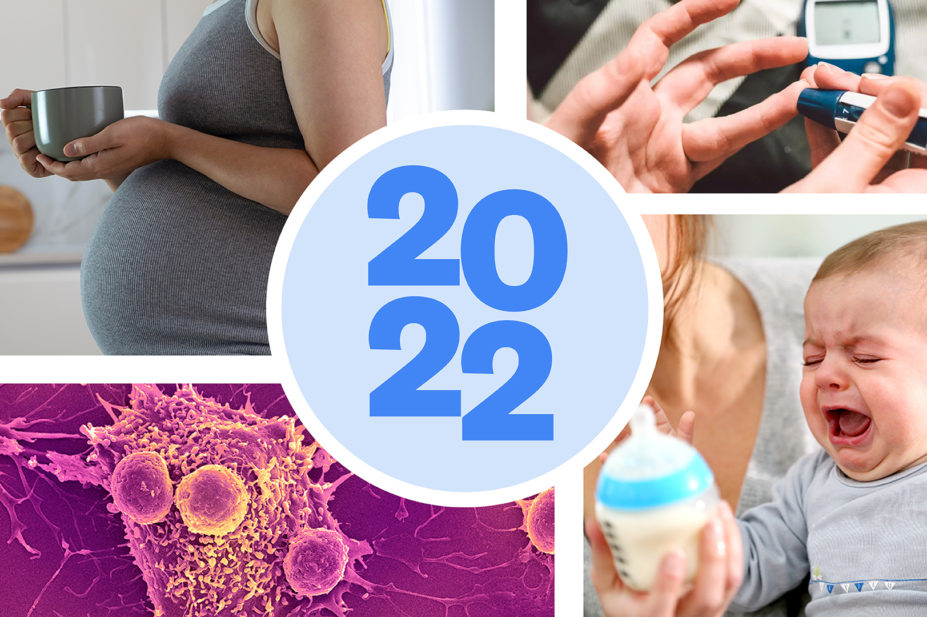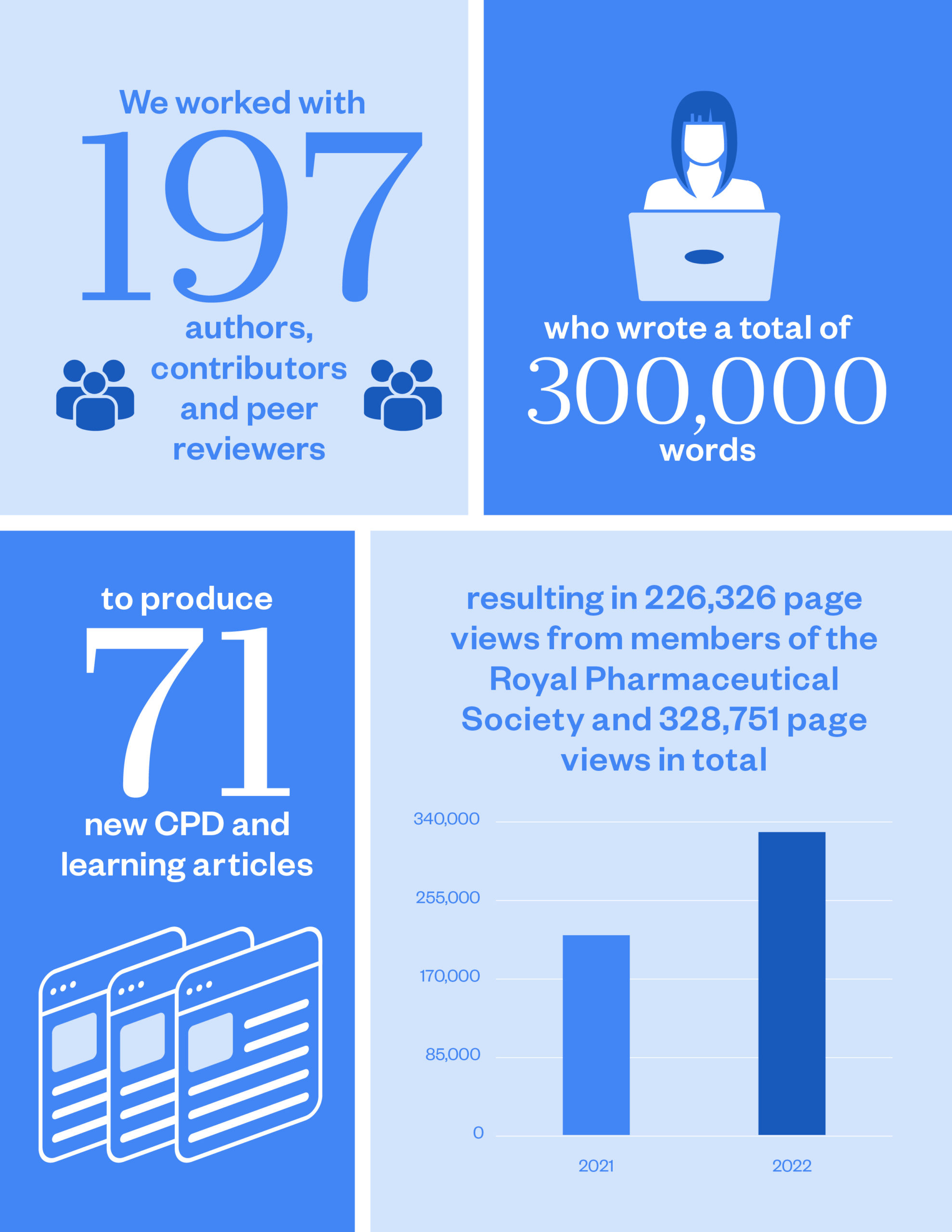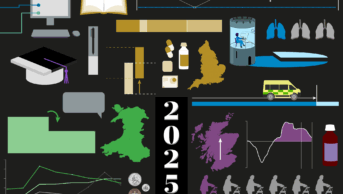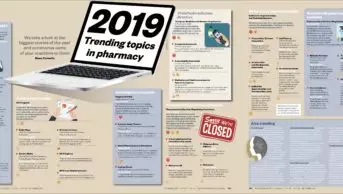
As the year draws to a close, we look back on the previous 12 months of Research, CPD and Learning articles published by The Pharmaceutical Journal, as well as the Royal Pharmaceutical Society’s (RPS’s) journal portfolio, to celebrate the achievements and contributions of our expert authors and peer reviewers.
2022 in numbers

With more than 15,000 total page views combined, the top five CPD and Learning articles for members of the RPS were:
- Liver function tests: indication and interpretation
- Electrolyte disturbances: causes and management
- Supporting patients on new direct oral anticoagulant medicines
- Treatment and management of gout: the role of pharmacy
- Best practice principles for inhaler prescribing
Although the most popular articles are clinical in focus, they show the diverse interests and roles our readers have in practice. From diagnostics and understanding new forms of treatment, to detailed learning on specific conditions, our focus has been on providing tangible information and principles to support best practice implementation.
Our next most popular articles outside of the top five were articles on vaccine hesitancy and remote consultations; a timely reminder of the important information delivered by our expert authors during the acute phases of the COVID-19 pandemic. Although developed during 2021, the topics remain just as relevant today.
Clinical conditions
Our case-based learning articles provide pharmacists with the opportunity to apply their knowledge to challenging scenarios and consider the realities of delivering person-centred practice.
In our 2022 reader survey, we asked you what type of information you most want to see. Similar to previous feedback and insights, you requested more in-depth content on clinical conditions. In 2022, articles on more than 20 different conditions were published and are available, alongside our back catalogue, on our condition-specific collection pages, accessible via the navigation bar on the PJ website.
Our digital editorial workflow and new website capabilities mean that we can respond more dynamically to changes in policy and guidance. In 2022, we have worked with our authors to establish a rolling update programme to ensure learning and CPD articles remain up to date and are based on the latest evidence. One example was our ability to thoroughly cover the new National Institute for Health and Care (NICE) Excellence guidance on type 2 diabetes mellitus, through a dedicated episode of the PJ Pod followed by a detailed update to our CPD article.
We published content in response to new NICE guidance on chronic kidney disease, gout, and iron deficiency anaemia. We have also commissioned authors to write new pieces addressing guidance changes on depression, glaucoma and COPD planned for publication in early 2023.
The Pharmaceutical Journal has continued to work with partners from the pharmaceutical industry in 2022 and, with the support of Merck, developed a package of independent editorial content on immunotherapy in cancer treatment, comprising articles on renal and bladder cancer, and a podcast on managing immunotherapy toxicities.
Themes of 2022
Three big themes were central to our publishing this year: women’s health, sustainability and the continued development of precision medicine and pharmacogenomics.
Women’s health
Developed in response to government strategies across the four nations to prioritise women’s health, we launched a dedicated women’s health hub page. We wanted to make it easier for pharmacists to find relevant information on different aspects of women’s health across the lifespan, and publish new articles that filled gaps or addressed an emerging need for up-to-date, evidence-based information.
We published new articles on premature ovarian insufficiency, drug and herbal medicine use during pregnancy, miscarriage and mental health considerations for older women, and have more content planned to build on this collection in 2023.
Sustainability
The climate emergency is a health emergency and 2022 has seen questions around sustainability move up the agenda. The NHS is responsible for 4% of England’s total carbon footprint, of which medicines account for 25% of emissions[1]. There are huge potential carbon savings to be made from optimising medicines use and appropriate prescribing of lower-impact interventions and devices. However, these benefits will only be realised if disease control is maintained, and optimisation requires skilful shared decision-making conversations with patients. These issues were explored in the Learning article ‘Best practice principles for inhaler prescribing‘.
Pharmacogenomics
This exciting field of medicine continues to gather pace and enters new areas of clinical practice, and so, as part of a PJ special, we worked with pharmacists to develop resources to support implementation in practice today that included interpreting a DPYD pharmacogenomics report, familial hypercholesterolaemia, CAR-T cells, advanced therapy medicinal products, circulating tumour DNA and CFTR modulator therapy.
Professional skills
Our professional skills content is commissioned to support pharmacists in developing their practice in line with the RPS Foundation Pharmacist Framework, the RPS Core Advanced Pharmacist Curriculum and the Competency Framework for all Prescribers. The articles are full of practical advice and aim to support the development of personal and professional skills. The most-read professional skills article of 2022 explored the transition to independent pharmacist prescribing — another area of focus for us in 2023. We have also published articles on topics including reflection, supervision, complex decision making, quality improvement and more.
We would like to take this opportunity to extend our thanks to all of our expert authors and contributors for their ongoing support and to our Peer Review Advisory Board for their crucial role in the editorial process.
Research: the growing RPS journal portfolio, literature reviews and perspectives
Helping you to stay close to emerging trends and changes in the evidence base continues to be one of our central aims. We have published seven literature reviews and perspectives this year, covering topics ranging from the drug–microbiome relationship, medication errors in care homes, using DNA biomarkers in cancer treatment and 3D printing.
The RPS research journals, published in partnership with Oxford University Press (OUP), have had another strong year. The Journal of Pharmacy & Pharmacology (JPP) achieved a new impact factor of 4.810, an increase for the fifth year in a row. This lifted JPP onto the second tier of pharmacology and pharmacy journals, and is the result of an increased focus on quality of research accepted for publication. Another highlight was the launch of RPS Pharmacy and Pharmacology Reports. A new open-access journal and the sister journal to JPP, it prioritises scientifically sound results from pharmacy and pharmacology researchers across the world.
Our other titles, International Journal of Pharmacy Practice and Journal of Pharmaceutical Health Services Research, have continued to grow their impact by launching themed issues on key topics and working with OUP to promote highly cited papers. Both journals will receive their first impact factors in June 2023.
We would like to express our grateful thanks to David Jones, Christine Bond, Albert Wertheimer and Dennis Douroumis for their devoted work as editors-in-chief on the RPS journals. Our thanks also go to Editorial Board members, as well as authors, reviewers and readers for their continued support and engagement.
Looking ahead
We look forward to continuing to publish high quality resources to support pharmacists in their learning and development in 2023. We have a full programme of new learning episodes for the PJ Pod and some exciting improvements in store for our articles, with new interactive features and enhanced self-assessment tools coming soon (see the 2022 CPD and Learning quiz).
If you have any feedback or suggestions for future topics, or would like to know more about writing for The Pharmaceutical Journal, please get in touch with us.
The Research, CPD and Learning team
Alex Clabburn, senior editor: alex.clabburn@rpharms.com
Caitlin Killen, assistant clinical editor: caitlin.killen@rpharms.com
Katherine Sole, editor: katherine.sole@rpharms.com
Michael Dowdall, executive editor: michael.dowdall@rpharms.com
Alice Shuttleworth, managing editor — journals: alice.shuttleworth@rpharms.com
- 1Delivering a ‘Net Zero’ National Health Service. NHS England. 2022.https://www.england.nhs.uk/greenernhs/publication/delivering-a-net-zero-national-health-service/ (accessed Dec 2022).
2 comments
You must be logged in to post a comment.



Please send me alert emails as before with information on CPS articles and up. to date news. The last email received from your end was back in September
Users who have received email alerts in the past but are now not receiving these should check their email junk folder and check the newsletter alerts that they have signed up to in their preference centre.
Information on how to set and update your preferences and subscribe to newsletters can be found here: https://pharmaceutical-journal.com/preferences-and-newsletters
Michael Dowdall - Executive Editor, Research & Learning